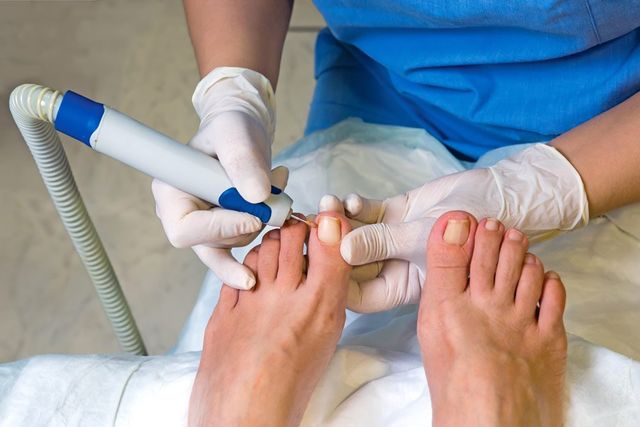
Image Source: Google
Dealing with ingrown toenails can be a painful experience that many people face at some point in their lives. Whether it's from improper nail trimming, wearing ill-fitting shoes, or genetics, ingrown nails can cause discomfort, swelling, and even infection if not properly taken care of. If you are looking for the best ingrown nail treatment for your need then, you can search online sources.
Understanding Ingrown Nails
Causes of Ingrown Nails
- Improper nail trimming: Cutting toenails too short or not straight across can cause the nail to grow into the skin.
- Ill-fitting shoes: Shoes that are too tight or narrow can put pressure on the toes, leading to ingrown nails.
- Genetics: Some people are predisposed to ingrown nails due to the shape and structure of their nails.
Symptoms of Ingrown Nails
- Pain and tenderness along the side of the nail
- Swelling and redness around the nail
- Pus or drainage if an infection is present
Treatment Options
1. Soaking the Feet
Soaking your feet in warm water can help reduce pain and swelling associated with ingrown nails. Add Epsom salts or antibacterial soap to the water for added relief.
2. Proper Nail Trimming
Trim your toenails straight across to prevent them from growing into the skin. Avoid cutting the nails too short or rounding the edges.
3. Wearing Proper Footwear
Choose shoes that provide enough room for your toes and avoid tight, narrow shoes that can put pressure on the nails.
4. Pain Relief Medication
Over-the-counter pain relievers like ibuprofen or acetaminophen can help alleviate pain and reduce inflammation caused by ingrown nails.
5. Professional Treatment
If home remedies are not effective or if the ingrown nail is severe, it's best to seek professional help. A podiatrist can safely trim the nail and recommend further treatment options.
Home Remedies
1. Apple Cider Vinegar Soak
- Mix equal parts of apple cider vinegar and warm water in a basin.
- Soak your feet in the solution for 15-20 minutes.
- Apple cider vinegar has antibacterial properties that can help prevent infection.
2. Tea Tree Oil Application
- Dilute tea tree oil with a carrier oil like coconut oil.
- Apply the mixture to the affected area using a cotton ball.
- Tea tree oil has antiseptic and anti-inflammatory properties that can help reduce swelling and prevent infection.
3. Epsom Salt Compress
- Dissolve Epsom salts in warm water.
- Soak a clean cloth in the solution and place it on the ingrown nail.
- Leave the compress on for 15-20 minutes to reduce pain and inflammation.
4. Warm Compress
- Soak a clean washcloth in warm water.
- Place the warm compress on the affected toe for 10-15 minutes.
- Repeat several times a day to help reduce pain and promote healing.
5. Hydrogen Peroxide Rinse
- Mix equal parts of hydrogen peroxide and water.
- Soak a cotton ball in the solution and apply it to the ingrown nail.
- Hydrogen peroxide can help disinfect the area and prevent infection.
Prevention Tips
1. Proper Nail Care
- Trim your toenails straight across and avoid cutting them too short.
- Avoid picking or tearing at the nails, as this can lead to ingrown nails.
2. Wear Proper Footwear
- Choose shoes that are comfortable and provide enough room for your toes to move freely.
- Avoid shoes that are too tight or narrow, especially in the toe area.
3. Maintain Good Hygiene
- Keep your feet clean and dry to prevent fungal infections that can contribute to ingrown nails.
- Avoid sharing towels or nail clippers to prevent the spread of bacteria or fungus.
By following these treatment options, home remedies, and prevention tips, you can effectively soothe sore toes caused by ingrown nails and prevent future occurrences. Remember, if the pain persists or if you notice signs of infection, it's essential to seek medical attention from a healthcare professional.